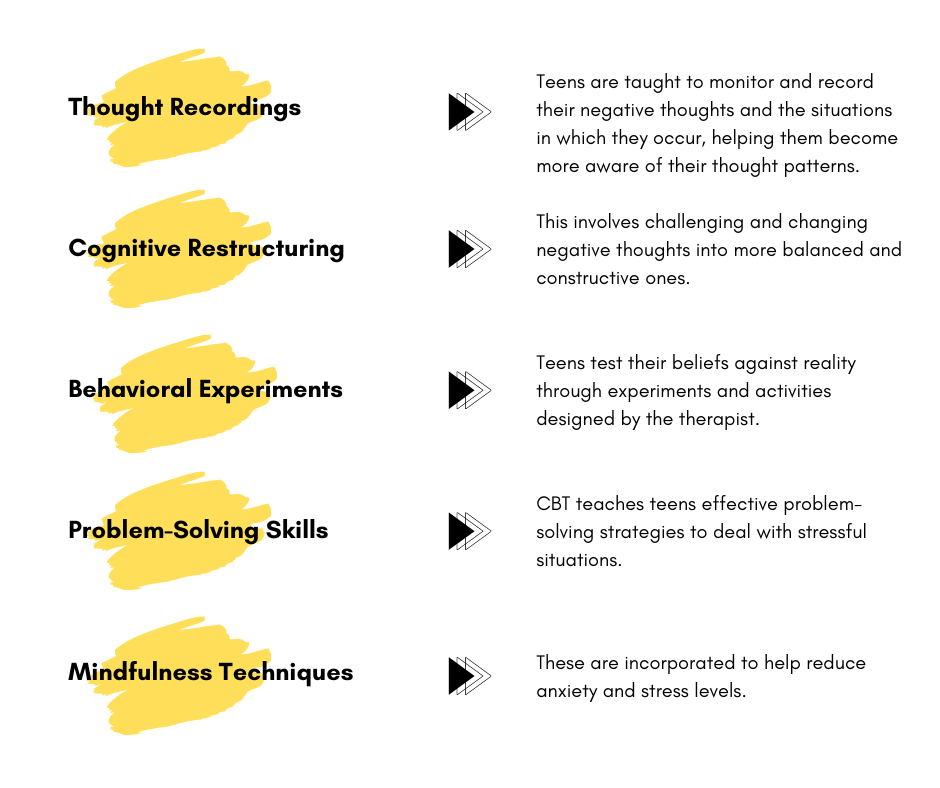Understanding Teen Therapy and Its Benefits
Understanding the importance of mental health support for teenagers is crucial in today's fast-paced and often overwhelming world. Teen therapy provides a structured environment where young individuals can express their feelings, confront their issues, and learn coping strategies under the guidance of a professional. We’ll unfold the various types of teen therapy, the benefits of each, signs that indicate a teen might need professional help, and how parents can approach this sensitive topic.
Types of Teen Therapy
Exploring the various types of therapy available for teenagers is the first step in finding the right support for your teen's unique needs. Each therapy type offers distinct approaches and benefits, tailored to address specific mental health challenges and promote emotional growth.
Cognitive Behavioral Therapy (CBT) for Teens
Cognitive Behavioral Therapy, commonly referred to as CBT, is a therapeutic approach that has shown significant effectiveness in treating a variety of mental health issues among teenagers. The core principle of CBT is the interconnection between thoughts, emotions, and behaviors. It posits that negative thought patterns can lead to adverse emotional states and destructive behaviors, which can cycle back to reinforce these thoughts.
For teens struggling with anxiety, depression, and stress, CBT works by helping them identify their negative or irrational thoughts and challenging these patterns to alter their emotional responses and behavior.
This process involves several techniques:
CBT sessions are typically structured and goal-oriented, with the therapist and teen working collaboratively to identify goals and work through strategies to achieve them. This therapy empowers teens by teaching them coping mechanisms and strategies they can use throughout their lives, fostering resilience and a more positive outlook.
Dialectical Behavior Therapy (DBT) for Teens
Dialectical Behavior Therapy (DBT) is a specialized form of CBT designed to help individuals better manage their emotions, improve their relationships, and reduce self-destructive behaviors. It is particularly beneficial for teens experiencing intense emotions, self-harm tendencies, or suicidal thoughts.
DBT typically involves both individual therapy sessions and group skills training, where teens learn and practice these skills in a supportive environment. The group component allows teens to share experiences and learn from each other, fostering a sense of community and understanding.
Family Therapy for Teens
Family therapy recognizes the family as a system where each member's behavior affects the whole. For teens facing mental health challenges, family dynamics can play a significant role in their well-being. Family therapy aims to improve communication, resolve conflicts, and create a more supportive home environment.
This form of therapy involves multiple family members in the sessions, allowing the therapist to observe interactions, identify patterns, and facilitate healthier exchanges. Techniques and objectives include:
Enhancing Communication: Teaching family members to communicate their needs and feelings openly and constructively without resorting to blame.
Resolving Conflicts: Providing strategies to resolve conflicts in a manner that strengthens relationships rather than eroding them.
Understanding Roles: Identifying and addressing the roles each family member plays within the family system that may contribute to stress or dysfunction.
Strengthening Bonds: Encouraging activities and interactions that strengthen the family unit and support each member's mental health.
Group Therapy for Teens
Group therapy offers a unique therapeutic environment where teens interact with peers facing similar issues under the guidance of a therapist. This setting allows teens to share their experiences, offer support, and learn from each other, promoting empathy and social skills.
Online Therapy for Teens
Online therapy has emerged as a vital resource for providing mental health support to teens, offering flexibility and accessibility that traditional therapy settings may not. Through video calls, messaging, and digital resources, online therapy can reach teens regardless of their geographical location or schedule constraints.
Benefits of online therapy include:
Accessibility: It removes barriers to accessing therapy, such as transportation issues or living in remote areas.
Convenience: Sessions can be scheduled around the teen's commitments, making it easier to integrate therapy into their lives.
Comfort: For many teens, communicating through digital platforms feels more natural and less intimidating.
Variety of Resources: Many
Warning Signs Your Teen Might Need Therapy
Silence in a teen often speaks louder than words, signaling a cry for help that therapy can answer.
Recognizing when your teen may need professional help is a crucial aspect of supporting their mental health and well-being. Here are some warning signs to watch for that could indicate your teen might benefit from therapy.
Emotional and Behavioral Changes
Sudden mood swings, increased irritability, or changes in eating and sleeping patterns can indicate underlying issues.
Academic Problems
A noticeable decline in grades or disinterest in schoolwork might be a sign of emotional distress.
Social Withdrawal
Pulling away from friends or family and losing interest in activities they once enjoyed could signal the need for professional help.
Risky Behaviors
Engaging in risky activities, substance abuse, or self-harm are critical warning signs that should not be ignored.
“It is not our differences that divide us. It is our inability to recognize, accept, and celebrate those differences.”
Approaching the Subject with Your Teen
Approaching the subject of therapy with your teen is a delicate process that requires sensitivity and understanding. It's important to start the conversation in a calm and private setting, where you can express your concerns without making your teen feel judged or cornered. This approach helps create a safe space for open dialogue.
Being supportive and not judgmental is key; actively listen to your teen, offer empathy, and reassure them that seeking help is a sign of strength, not a weakness. Furthermore, involve your teen in the process of seeking professional help.
Research therapists together and include them in the decision-making process. This collaborative approach ensures that your teen feels supported and understood, fostering a positive attitude towards therapy.
Conclusion
Recognizing the need for teen therapy and understanding its various forms can empower parents to take proactive steps in supporting their teen's mental health. By acknowledging the warning signs and approaching the subject with care and empathy, parents can help their teens navigate the challenges of adolescence with the right support.
Teen Therapy FAQs
What is teen therapy?
Teen therapy is a form of psychological counseling specifically designed to address the unique challenges and issues faced by teenagers.
How do I know if my teen needs therapy?
Look for warning signs like changes in behavior, academic struggles, social withdrawal, and risky behaviors.
How do I choose the right type of therapy for my teen?
Consider your teen's specific needs and challenges, and consult with a mental health professional to determine the most suitable approach.
Can therapy be harmful to teenagers?
When conducted by a licensed and experienced therapist, therapy is a safe and effective way to support a teen's mental health.
How can I support my teen during therapy?
Be open, supportive, and actively involved in their therapeutic journey without being intrusive or judgmental.
Author
Meet the SBCS Team
At Space Between Counseling Services (SBCS), we're a team of diverse therapists passionate about enriching your mental health through insightful articles. Licensed across MD, NM, DE, DC (District of Columbia), and FL, we blend expertise in anxiety, depression, trauma, and more, striving for inclusivity in every piece we write.
Our collective voice aims to guide, educate, and support you through modern life's complexities.





